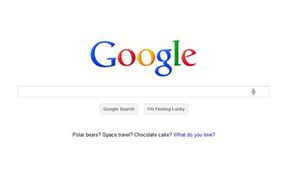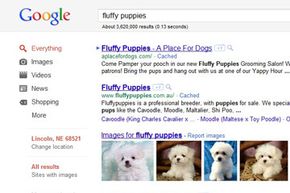I Google, therefore I am. But what if there were no Google? In our digitally frenzied and tech-saturated world, that question borders on a religious and philosophical query worthy of Socrates (and that guy definitely didn't have a smartphone).
As a search engine and purveyor of many powerful online applications, Google is so pervasive that many of us interact with the company's products all day, every day. And even for those who only use the Web sporadically, online forays are often guided by Google's seemingly omniscient search prowess.
Advertisement
It's hard to say exactly how the world would look without Google, the world's most frequently visited Web site [source: Alexa]. But there are hard numbers that wouldn't exist without this Silicon Valley behemoth. Google is a big company, employing around 30,000 people as of this writing [source: Google]. It also tries to share the wealth; in 2010, Google's charitable giving topped $184 million [source: Google].
Google offers a whole suite of applications (too many to list here), and a lot of them are free. You can use Gmail for e-mail, Docs for sharing all sorts of documents, Maps for navigation, Earth for geographic and topographic information (and even oceanographic maps), Calendar to organize all of your life's activities, Analytics for tracking statistics regarding your Web site and Blogger to set up a blog for both personal and professional purposes. The lineup also includes Google Scholar, Patents, Google + (for social networking a la Facebook), Groups, Finance, and many more.
There's also Image search, which lets you find just about any image that's ever wound up online. And of course, there's the Google search engine, which revolutionized the way we find information on the Web. Google simply offers a lot of ways to accomplish a lot of different tasks, for not a lot of money.
When Google first appeared in 1998, search engines were a matter of personal preference. Some people opted for the visually busy layout of Yahoo. Others liked Webcrawler, Altavista, Dogpile, HotBot, Ask Jeeves or Excite.
But then Google arrived, with its supercharged algorithms that returned more relevant results, and suddenly, it was the fastest and easiest way to find Web-based data. Older search sites located relevant information by finding keywords on Web pages. Google, however, employed its patented PageRank system, which uses dozens, or perhaps hundreds, of criteria to sift through the Web and find the best possible source for "Santa Claus hat for dogs" or whatever else you might be attempting to locate.
The company was following through on its stated mission, which is to "organize the world's information and make it universally accessible and useful," and to be an engine that "understands exactly what you mean and gives you back exactly what you want."
There's no question that Google has delivered on many of its goals. But where, exactly, would we be without it? We'll ponder that hypothetical situation on the next page.
Advertisement




